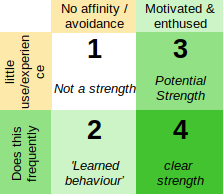The UK Civil Service introduced strengths based questions for recruitment when they introduced Success Profiles in late 2018. Before this strengths based questions had been used in the final selection boards for the Fast Stream. They’re really good for when you are looking for potential in candidates rather than people who are already experienced at doing the job. Give this strengths are best used when candidates aren’t likely to have much relevant experience or high levels of technical skill. So entry level jobs, or transition from doers to leaders will often use them. They’re much less useful when recruiting established professionals, where experience and technical skills are a better approach.
How Strengths Interviews Work
For strengths to work you need to establish a baseline of response to something that engages the candidate, and for which they have experience. So you start with something that everyone should be able to talk about. This is known as the baseline question, and will be something like “tell me what you do to relax at the weekend?”
What this does is show the panel how the candidate looks when engaged. There’s quite a different art to strengths questions, as a panel member you need to watch as well as listen. There are two axes to to score the candidate on. Do they seem engaged/enthusiastic about their answer, and do they know how to deal with the situation being asked about. You only fail if you don’t meet either test.
From a candidate perspective, listen to the question, don’t take too long to reflect on it, and make sure you give a full answer. There aren’t follow-up questions to strengths, so you need to tell the panel everything you think they need to convince them that this is a real strength, or at least a well practiced learnt behaviour.
Scoring Strengths Answers
Strengths are scored out of 4, using the matrix on the right.

Panels are looking for two things. These are semi-independent of each other.
- One is whether you seem to have an affinity for the strength. Body language, tone, fluency etc. show this. That’s the reason for the baseline question at the beginning. By starting with something that should elicit a positive response then the panel can compare it with future responses.
- The other thing they’re trying to ascertain is whether or not you have experience in acting in the way the strength suggests, and how often you take the opportunity to use it. Talking about when you did that helps with this, but even a hypothetical answer can give you a good idea.
A score of 1 is the only score that would indicate a failure. People that don’t seem to have enthusiasm for it will score either a 1 or a 2, the latter indicated that there is a learned behaviour for dealing with those sorts of situations. Someone who appears attracted to the area would score a 3 or 4. Again the higher score is for people where there seems to be real experience of the area.
How can I prepare for Strengths Questions?
A lot of the guidance suggests that you should give an initial honest answer, and that preparation carries a risk that you are not authentic in your response. This is a risk, but it doesn’t mean that you should do absolutlely no preparation. It can be useful to think about some of the what ifs and how you would deal with them so that you don’t have too much of pause while you think.
The strengths dictionary is published on gov.uk. You can use it to work out which ones are more likely for the job you have applied for. What is needed to do well in it? Use that mental prep to guide you, and don’t fall into the trap of just agreeing with the statement that the panel ask you about. For example, one of the panels I was on wanted to avoid leading people on a strength, so we asked about the opposite of what we wanted in the hope that the candidates would disagree with us. This worked for some, but not all, of the candidates. So this strength helped to determine the merit order of our successful candidates.

Hello Red Leader,
I found this a really helpful article. I have an interview with DEFRA next week and feel that the strengths side of my preparation needs a bit more work. I’ve plenty of experience, but having worked in the church I’m even less accustomed to speaking about my strengths than I could be.
I’m being interviewed for an HEO facilties role, co-ordinating the work of external service-providers and ensuring health & safety is complied with.
I really want to succeed and am working hard to polish my presentation.
Thanks
Good luck with your interview